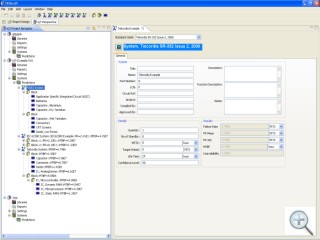MIL-HDBK-217F Notice 2 Electronic Reliability Prediction
The MIL-HDBK-217 Module of IQT is a powerful reliability prediction program based on the internationally recognized method of calculating electronic equipment reliability defined in MIL-HDBK-217 (published by the US Department of Defense). This standard uses a series of models for various categories of electronic, electrical and electro-mechanical components to predict failure rates that are affected by environmental conditions, quality levels, stress conditions and various other parameters. These models are fully detailed within MIL-HDBK-217.
The MIL-HDBK-217 module provides a user friendly interface which allows the user to construct, analyse and display, system models using interactive facilities. Building a hierarchy and adding new components could not be easier. The program calculates the failure rates, including Mean Time Between Failure (MTBF), associated with new components as they are added to the system, along with the overall system failure rate. Project data may be viewed both via grid view or dialog view simultaneously, allowing predictions to be performed with a minimum of effort.
Library management, import and export facilities are also provided. Quality user-configurable reports are produced by the program automatically. In addition, data may simply be dragged and dropped into Microsoft applications such as Word, Excel, Access etc. allowing a wide range of additional customised reports and charts to be produced.
Developed in collaboration with the Defense Micro-Electronic Activity (DMEA), the detail model allows the user to more accurately model the VHSIC, VLSI/CMOS component within the MIL-HDBK-217F analysis. This in turn leads to a more accurate Failure Rate and MTBF. The Detail Model goes into greater depth in the physical side of the component and looks into areas including: common; oxide; metal; hot carrier; contamination and package.
The IQT MIL-HDBK-217 module also supports the calculation of the MTBF and Failure Rate of equipment during non-operational periods. Based upon the RADC-TR-85-91 standard, this built-in calculation allows you to further refine your analysis.
The MIL-HDBK-217 standard is limited as to the types of connection technologies it supports. ITEM has added the ability for you to define custom connection technologies and their failure rates for use in the analysis. Any connection technology, such as sonic welding or gold-to-gold solder, with a known failure rate can be used.
- Powerful and user friendly MIL-HDBK-217 electronic reliability prediction software
- Combine prediction methods for complex analysis
- Build and open multiple systems and project files
- Drag and drop components and systems between projects
- Mean Time Between Failure (MTBF) calculation
- Powerful charting facilities
- User defined custom library facilities
- Import and export to MS Excel, Access and Word etc.
- Advanced hybrid linking and modeling
- Multi Systems within the same project
- Transfer to and from any other module
- Redundancy modelling including hot standby
- External Arrhenius temperature model for user defined failure rates
- Linked Blocks, represent blocks with identical characteristics
|

> Electronic Reliability Prediction Software
> US Military Standard MIL-HDBK-217F Notice 2
> Mean Time Between Failure Calculation
> Advanced Hybrid Linking and Modeling
> Redundancy Modelling Including Hot Standby
> User Defined Custom Libraries
> Extensive Reporting and Charting Facilities |